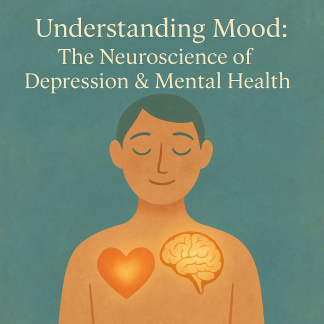Understanding Mood: The Neuroscience of Depression & Mental Health 🧠💬
What Is Depression, Really? 😔
We throw around the word “depression” a lot in everyday life. “I’m so depressed my flight was cancelled,” or “That series ending was depressing.” But depression in its true clinical form is a very different experience—one that is often misunderstood, minimized, or overlooked altogether.
This post begins our journey into the neuroscience of mood. We’ll explore what depression actually is, how it shows up in the brain and body, and why understanding the difference between sadness and clinical depression matters.
Types of Depression: A Full Spectrum 🌈
Depression doesn’t look the same for everyone. It exists on a spectrum—from mild episodes of low mood that pass in a few days, to more persistent moderate forms, to severe, life-disrupting depression that can last for months or even years.
Some people experience what’s known as Major Depression (or Unipolar Depression), marked by a deep, ongoing low mood, fatigue, emotional flatness, and often a sense of hopelessness or disconnection. Others may face Bipolar Depression, which includes these low periods but also features manic or elevated phases—periods of increased energy, impulsivity, or risk-taking that can be equally disruptive.
There are also forms like Persistent Depressive Disorder (dysthymia), which may not be as intense but can linger for years, and Situational or Reactive Depression, which may follow a life event or trauma.
No matter where it falls on the spectrum, every experience of depression is valid—and worthy of understanding and support. 💛
What Depression Really Looks Like 🧩
It’s more than feeling low. In fact, some people with depression don’t feel “sad” at all. They feel nothing.
Here are some of the core signs:
- Loss of interest or joy – when things that once felt good now feel dull, flat, or meaningless 🎨
- Fatigue – feeling mentally and physically drained for no clear reason 😴
- Sleep disruption – especially early morning waking with difficulty going back to sleep 🌙
- Appetite changes – often reduced, but can also swing the other way 🍽️
- Guilt – often disproportionate and relentless ⚖️
- Low self-worth – feelings of failure, shame, or hopelessness 🫥
- Negative thought spirals – when your mind starts generating harsh self-judgments or convincing you that you're failing, even when it's not true 🌀
Why This Isn’t Just “Feeling Down” ⬇️
Sadness usually passes. Depression lingers. It affects your sleep, your appetite, your ability to think clearly, to make decisions, to connect with people. It touches every corner of life.
And importantly—it’s not your fault. Depression is a multi-layered condition with biological, psychological, and environmental roots. It’s not a weakness or a character flaw. 🧬
What Helps 🛠️
One of the most powerful antidotes to depression is understanding. When we know what we’re dealing with, we can stop blaming ourselves and start choosing tools that actually help.
And one of the most consistently effective tools, supported by decades of clinical research, is psychotherapy. 🗣️
Therapy offers more than just a space to talk. It helps us:
- Untangle overwhelming thoughts and feelings 🧶
- Make sense of past experiences and patterns 🕰️
- Reconnect with parts of ourselves that may have gone quiet or numb 🫂
- Learn practical ways to regulate mood and reduce self-blame 🧘
- Feel seen, heard, and supported without judgment 🤝
Multiple studies show that talk therapies, especially approaches like CBT, ACT, person-centred to talk therapy, and relational models, can significantly reduce symptoms of depression. For many, therapy works just as well—or better—than medication, especially in the long term.
Sometimes the most healing thing is simply having someone walk alongside you, helping you make sense of what feels senseless. 🌿
That’s what this series is about.
A Gentle Offering 🤍
If you’ve found yourself feeling numb, flat, or persistently low—know this: there is nothing shameful about your experience. You’re not broken. You’re human, and your nervous system might just be calling for help. Call me and I will try to help. 📞
Reflection prompt: What has your experience of low mood felt like—emotionally, physically, and mentally? What parts of you might need tending, rather than fixing? ✍️
Written by Jon Rowe, trauma therapist & founder of Relational Psychotherapy. Learn more at jon-rowe.com

